
When Greta Westwood was 4 years old, she read a children’s book about Victorian nurse Florence Nightingale. Decades later, she still remembers being transfixed by the enduring image of the “Lady with the Lamp.” Westwood herself would go on to a distinguished nursing career of her own, starting out as a student orthopedic nurse in 1978. “From day one of putting the uniform on, I’ve never looked back,” she recalls.
Although she left Britain’s National Health Service in 2017 after nearly 40 years, Westwood has recently returned to her local hospital in Portsmouth, in the south of England, to help with the U.K.’s public health efforts in the coronavirus crisis. Westwood, who spoke to TIME on a busy Monday morning from the hospital, has been running psychological support sessions for nurses and midwives assisting patients with COVID-19 for the past six weeks.
That early image of Florence Nightingale, tending to wounded soldiers in the darkness with her lamp, has endured for so many nurses, for so many years, and takes on renewed significance as May 12 marks the 200th anniversary of Nightingale’s birth. It also marks International Nurses’ Day, commemorated in Nightingale’s honor. With nurses around the world on the front lines of a global pandemic, it’s a poignant time to reflect on how Nightingale’s legacy laid the groundwork for their heroic work in hospitals today. “It’s the trailblazing element I like about her,” says Westwood, who is also the CEO of the Florence Nightingale Foundation. “She never took no for an answer—anything was possible.”
Nightingale was born on May 12, 1820, to a wealthy aristocratic family in Italy, and grew up in England. As a teenager, she believed that she had heard a call from God encouraging her to help the sick and poor and felt a strong desire to become a nurse—although the profession was not seen as a respectable job at the time. Victorian social conventions also meant that women were generally expected to stay at home and run household affairs, not pursue careers; Nightingale turned down multiple marriage proposals because she felt it would interfere with her duty of caring for others. Her ambitions were particularly controversial given her upper-class background. But despite her family’s disapproval, she educated herself in arts and science and eventually gained some nursing experience at a Lutheran-run institution for the poor in Germany.
In March 1854, Britain entered the Crimean War, fighting in an alliance against Russia. Newspaper reports detailed the devastating state of hospitals that cared for the wounded, and, in the face of public outcry at home, War Minister Sidney Herbert appointed Nightingale to lead a contingent of 38 volunteer nurses to a military hospital in Scutari, in modern-day Turkey, in the November of that year, to help wounded soldiers returning from the front lines.
Nightingale’s team was immediately confronted by nightmarish conditions. More soldiers were dying of diseases such as typhus, typhoid, cholera and dysentery than from battle wounds, and the hospital wards were overcrowded with rat and lice infestations.
“What greeted her there must have been horrendous in terms of the squalor,” says David Green, director of the Florence Nightingale Museum in London. “But she stayed until the end, and made sure she looked after the common soldier, not just the officer.”
Nightingale’s compassion set her apart from others, says Green, and she gained her famous moniker for checking in on her patients by lamplight, often writing letters to loved ones at home on their behalf. At that time, the army didn’t always inform families when soldiers were killed, but Nightingale felt a duty to do so. That sense of duty to patient and family has been on full display during the COVID-19 crisis, as nurses champion the need to be with patients until the very end, and have campaigned for iPads so relatives can communicate with loved ones. “That is so Nightingale, and that compassion really carries home,” says Green.

Nightingale’s time at Scutari prompted several innovations that she would develop in the later years of her life. Although the male doctors at the institution saw Nightingale’s suggestions as criticisms, she remained steadfast, taking several measures to improve sanitation and hygiene at the hospital, including washing the linens and towels, purchasing necessary kitchen supplies, and emphasizing hand-washing with soap and water, which was not widely practiced at the time. However, through 1855, the mortality rate at the hospital continued to rise, as Nightingale mistakenly believed that nutrition and supply problems were the main cause of the issue, rather than the sanitation problem. A Sanitary Commission found that the hospital was built on a sewer, meaning that the water supply was contaminated and helping to increase the spread of disease.
Nightingale returned to Britain in 1856 having learned from the experience. In the years that followed, she championed sanitary health—and cemented her status as a national hero.
For the next 50 years of her life, she prioritized the establishment of nursing as a respected profession. Her 1859 book Notes on Nursing is still regarded today as a pioneering text, was written in simple language intended for women nursing in the home to understand. One of her first tasks after returning from the war was to set up a training school for nurses in 1860, the first to exist in the world, which still runs today. “If you speak to any nurse about nursing, everybody comes to work to do their best for their patient. Through all those years even when she came back from Crimea, that was her purpose in life,” says Westwood.
Despite battling depression and being intermittently bedridden from 1857, Nightingale wrote thousands of letters campaigning for public health and workhouse reform, and used her influence to network with Queen Victoria and prominent politicians. It was also from her experience in Crimea that she learned about efficient hospital planning and design. In correspondence with other hospitals around the world, from Sydney to New York City, she shared her knowledge and the resources of the “Nightingale Nurses” that had been trained through her school.
Significantly, Nightingale backed up her campaigns with evidence, statistics and data visualizations that were easy to understand, using diagrams to show the effects of infection and mortality rates in the Crimean War. “She was the pioneer of the first pie chart,” says Westwood, comparing the public’s need for data during Nightingale’s time and our own. “When the Prime Minister or Chief Medical Officer do their briefings on the coronavirus today, we now see that data published as infographics. Nightingale got it that people wouldn’t understand the data unless she made it explicit and unquestionable.”

While her legacy has endured two centuries later, Nightingale’s bicentennial comes at a crucial time for nurses on the front lines, and a moment of financial challenge for the museum dedicated to her memory, due to its current closure. “It’s ironic that many of the field hospitals [in the U.K.] have taken her name,” says Green of the Florence Nightingale Museum, which houses almost 3,000 artifacts dedicated to her legacy, “but the thing that is always around to remind everyone of her might not be.”
For the Florence Nightingale Foundation, which was set up in 1934 to remember her legacy and actively supports nurses and midwifes through scholarship programs, their usual commemoration of Nightingale’s birthday is adapting to the current lockdown situation. Supported by The Crown actor Helena Bonham Carter, whose great-great-grandmother Joanna was Nightingale’s aunt, the Foundation is launching the Florence Nightingale White Rose Appeal, through which people worldwide can buy an e-white rose to help support nurses currently working on the front lines. Each rose bought will form part of an actual floral display at London’s Westminster Abbey once lockdown ends, to celebrate the contribution of nurses and midwives everywhere.
It’s quite a different bicentenary compared to what Westwood had envisaged, but the woman at its heart would not have shied away from the difficulty.
“Celebrations is a weird word at this time, because it is tinged with sadness—so many nurses have died, and we mustn’t forget that,” Westwood says. “But Florence would be so proud of what nurses have managed to achieve during this pandemic.”
More Must-Reads from TIME
- Cybersecurity Experts Are Sounding the Alarm on DOGE
- Meet the 2025 Women of the Year
- The Harsh Truth About Disability Inclusion
- Why Do More Young Adults Have Cancer?
- Colman Domingo Leads With Radical Love
- How to Get Better at Doing Things Alone
- Michelle Zauner Stares Down the Darkness
Contact us at letters@time.com